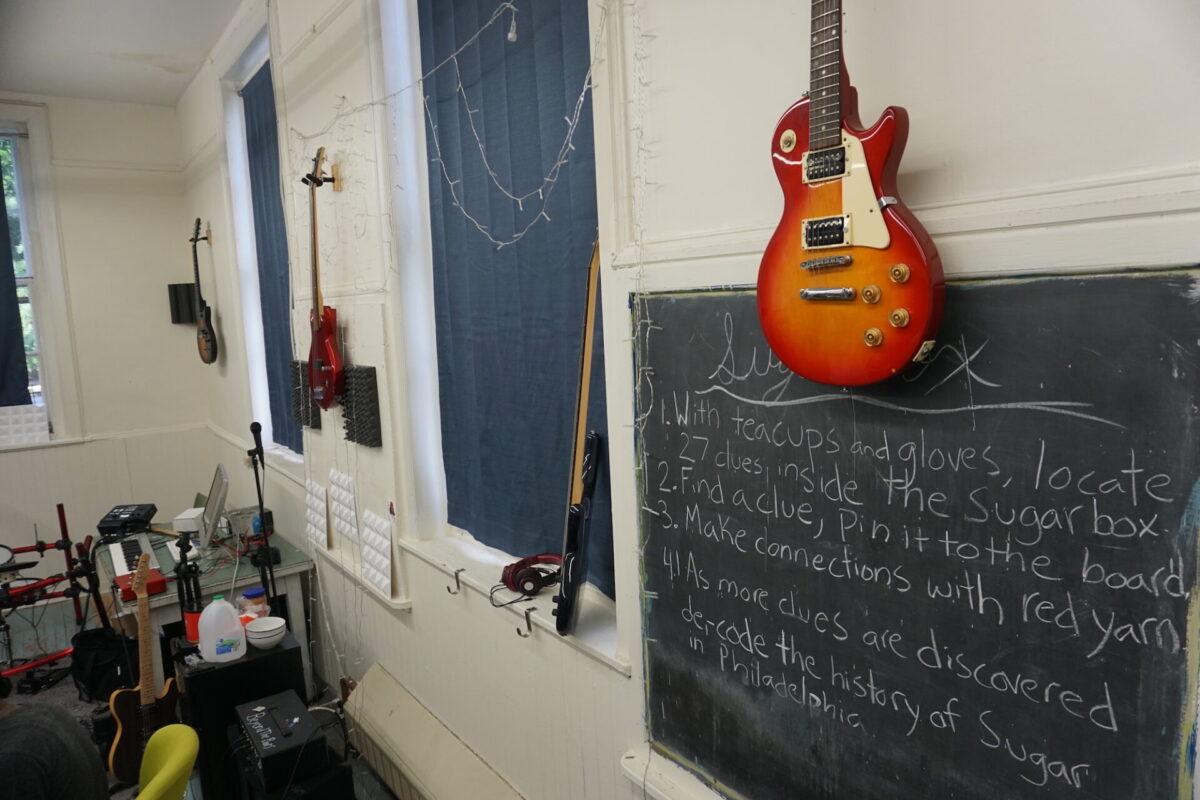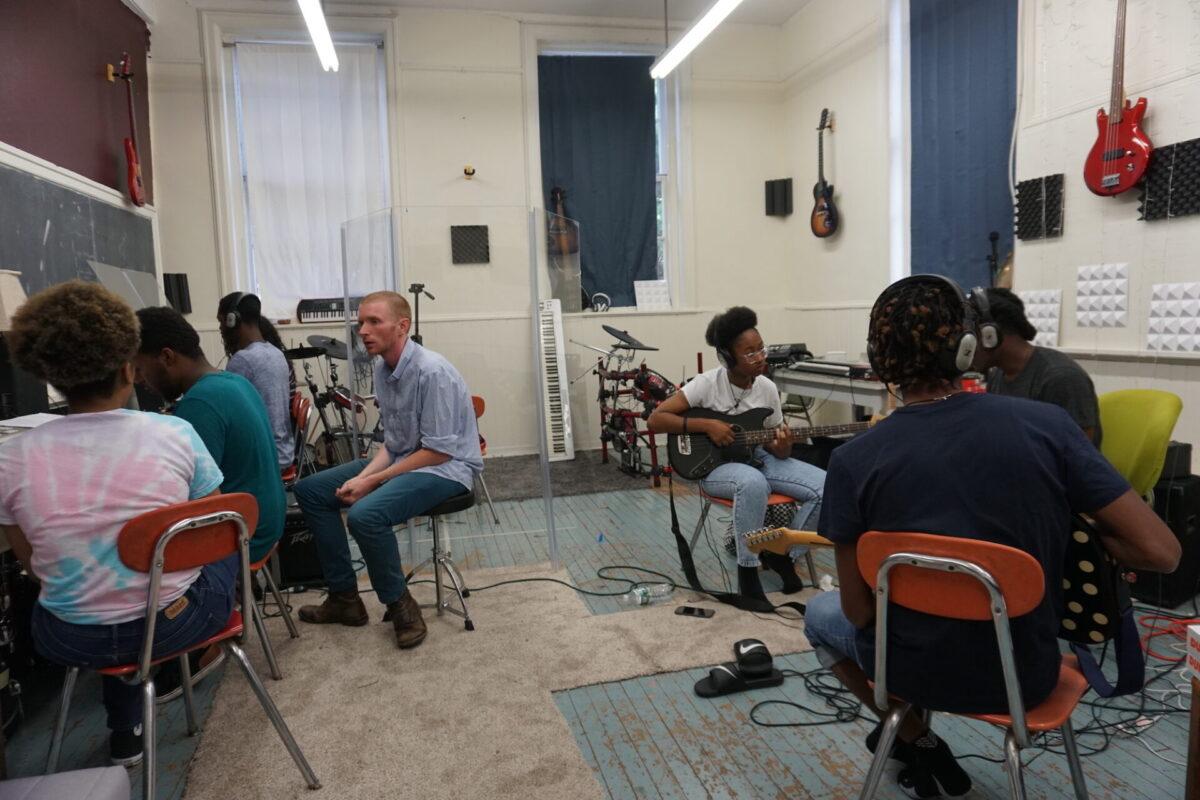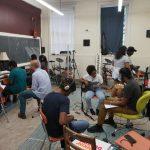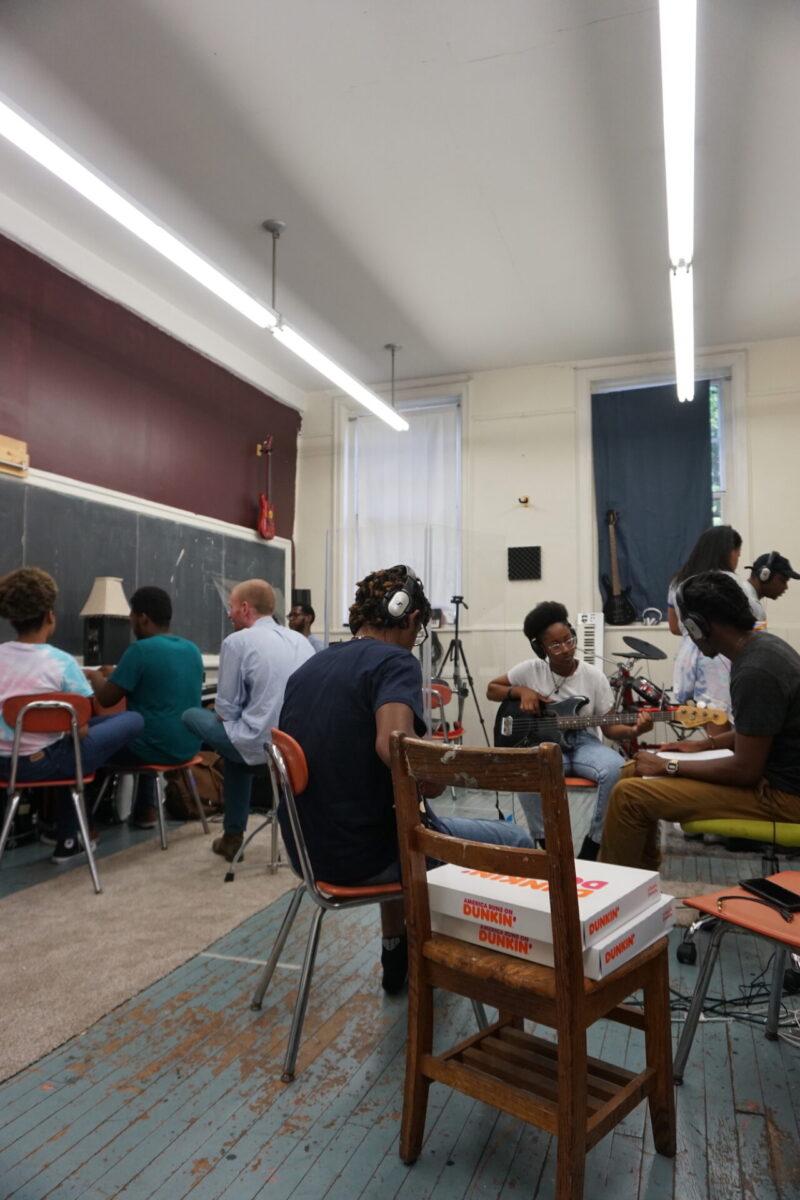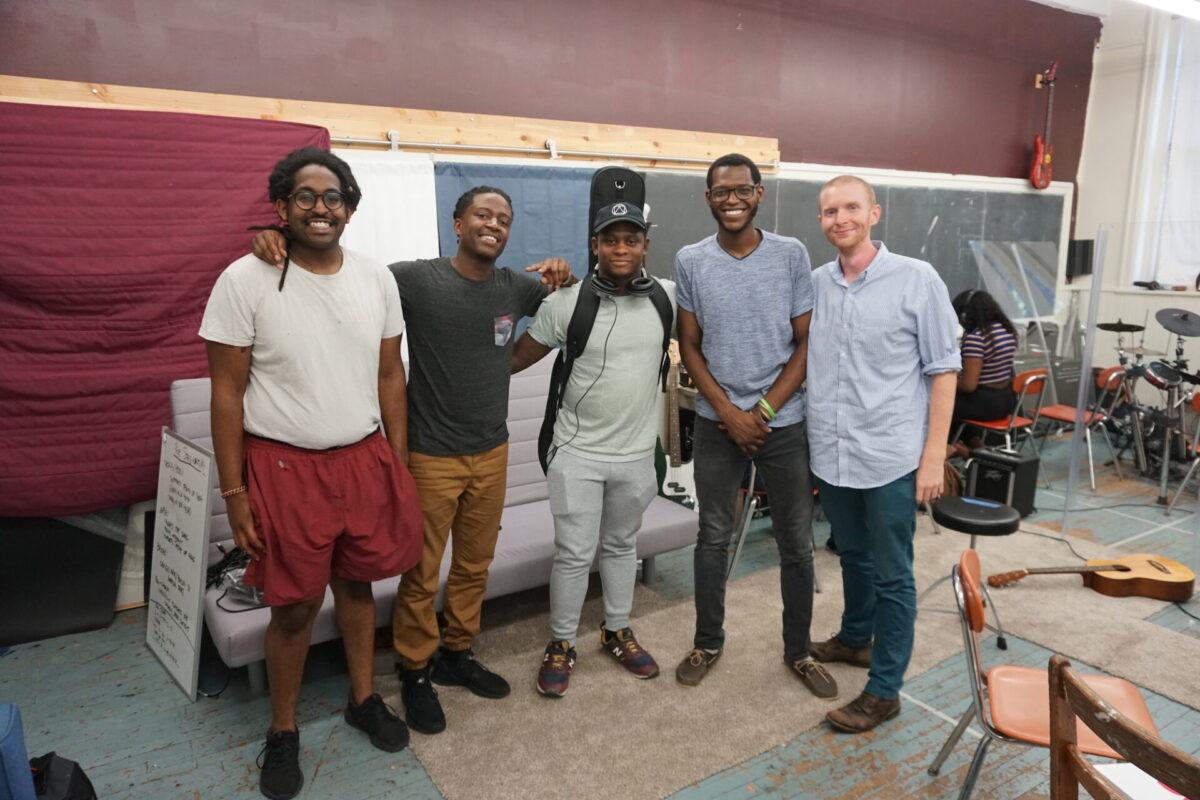How Beyond the Bars is helping Philly’s youth find their voice

Beyond the Bars | photo by Yoni Kroll for WXPN
The scene on a weekday afternoon at Beyond the Bars headquarters at the Community Education Center on Lancaster Ave. is a somewhat controlled chaos, with about a dozen teenagers practicing for an upcoming concert.
In one corner of the long rectangular room tucked into the converted Quaker meeting house on the edge of Drexel’s campus, a couple students are making beats on a computer while against the wall a pianist and singer are composing a song on the spot. There’s a group of four guitarists with headphones on in the middle of the room, three students and volunteer teacher and program director Bets Charmelus from the band Ill Fated Natives, working on something only they can hear.
Beyond the Bars Co-Executive Director Matt Kerr is moving around the space, cracking jokes and offering encouragement, oftentimes in the same breath. Kerr’s excitement is both palpable and totally unrestrained. He is obviously incredibly stoked about what the organization is doing and wants to tell everyone about it.
He has a lot to be proud of. Since Beyond the Bars started more than five years ago, the music education nonprofit — which has as its goal “providing positive and safe spaces where youth who have been impacted by the incarceration system can express themselves” — has achieved exactly that with countless students, huge concerts around the city, and most importantly, the creation of a community both outside and within the prison system.
The program was initially conceived just to serve the juvenile inmate population, first at the Philadelphia Industrial Correctional Center and now at Riverside Correctional Facility. Although they are working with younger inmates, including many teenagers, these are people who have all been tried and sentenced as adults. Kerr said there are plans in the works to also teach youth in home detention and at the Juvenile Justice Center as well as women who are incarcerated at RCF.
After a few years spent teaching within the prison walls, Kerr and the other volunteers came to the realization that they needed to expand their programming to other communities. According to him, “We were teaching 16 and 17 year olds who were amazing prodigies, they were better than me in no time. These are just amazing kids. Great young men, not kids. They had great hearts but they were looking at thirty, forty years, fifty years. We were teaching students who had really, really long sentences. It was destroying me.”
“We want to work to try and provide as many resources as possible outside of the jails” for young people who have been affected by incarceration in some way, he added. And with that the Student-Driven Music Academy was born.
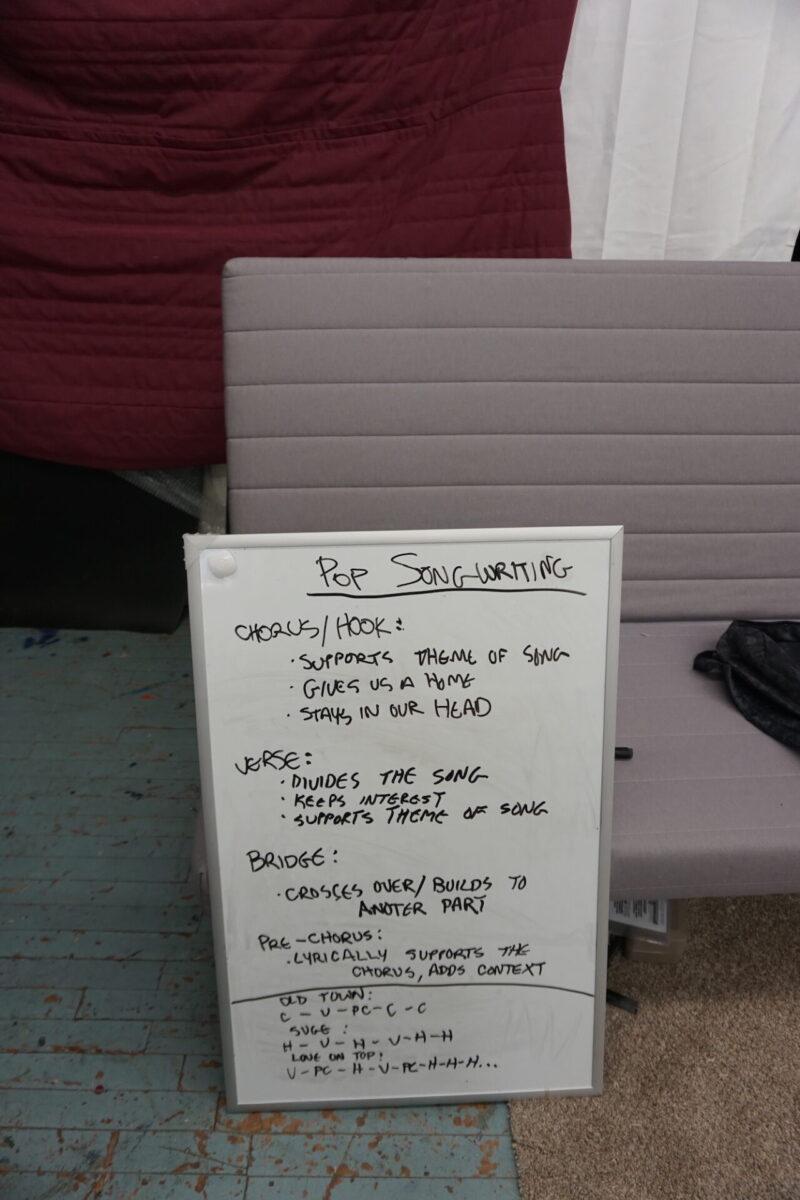
Beyond the Bars | photo by Yoni Kroll for WXPN
With a focus on songwriting, the after-school program aims to give the students at the CEC the “tools and a tool belt” for making music, as Kerr put it.
But it’s not just about the tunes. Charmelus explained that, “Music is what we do, but it’s more about art as an expression.” This is a reflection of his own musical journey, which like many started with piano lessons as a kid. While playing classical standards was fun, he didn’t find a connection with the music until “somebody taught me how to play the ice cream song.” That might sound a bit silly but learning how to perform something you might hear every day can be just as meaningful as mastering some Schubert or Beethoven, if not more so.
Figuring out the R&B tracks he was hearing on the radio at that time was also important. Covering those songs gave him the ability to express himself in a way that “added context” to what he was doing as a budding musician. It also gave him the ability to “actually take and process what I was going through every day and translate it into something that people actually listen to.”
These are all things he tries to pass along at Beyond the Bars. Unlike the more regimented structure of traditional lessons or even school band – assuming a student is lucky enough to go to a school where band or even just music classes are still offered – everything in the program is dictated by the participants. As Pierce Jordan, another teacher and also the singer of the band Soul Glo, said, “They come here with their ideas and it’s more like we’re just trying to give them the techniques to help them flesh out their own stuff.”
The students at Beyond the Bars come from all over the city for the classes at the CEC and an ongoing recording workshop in the Dornsife Center for Neighborhood Partnerships on Drexel’s campus. They might have a close relative who is incarcerated or could have had their own brushes with the prison system. One thing they are not, Kerr stressed, is ‘at risk.’ According to him, “The whole ‘at risk’ thing is bullshit. I hate that phrase. That will never be a phrase we use here. Anyone, when you take away resources, is at risk. You take a wealthy person and take away everything that they have, see what they do. That phrase ‘at risk’ is just trash.”
Kerr said there are plans to bring the same programming to the rec center at the Dendy Playground in North Philly this fall. “[The CEC] is our home base and I don’t see us needing to change that anytime soon,” he told The Key. But at the same time expanding to other locations around the city would help reach even more students, especially those who might not have the means to regularly make it out to West Philly. “The go-getters are going to take four trains and two buses [to get to the classes],” he said. “But I want someone who is casually interested in music to realize that they’re the amazing musician they already are.”
Trying to meet people where they are is both a hallmark of what Beyond the Bars has been doing these past few years and is also a necessary aspect of doing this kind of work within the incarceration system. As Charmelus put it, “It’s one thing to play a show and get sweaty and do all these things but if the knowledge isn’t getting taken anywhere it’s really just staying there, not living on.”
Kerr spoke about the emotional state of the students in prison and how when they perform, “you can hear within their raps a significant amount of the traumas they’ve gone through.” That was something echoed by Jordan, who has taught in the prison system in the past. According to Kerr, “To think about having to deal with even a third or maybe a fifth of those traumas without any form of expression or resources out there … is all you need to know as far as how our systems are structured to try and hurt our young people.”
Creating an alternative to those systems is at the foundation of Beyond the Bars. Kerr told The Key that he views it as being related to classic social psychologist Abraham Maslow’s Hierarchy of Needs, which proposes that you can’t achieve self-actualization – in other words, reach your full potential – without first having all of your physical and emotional needs met.
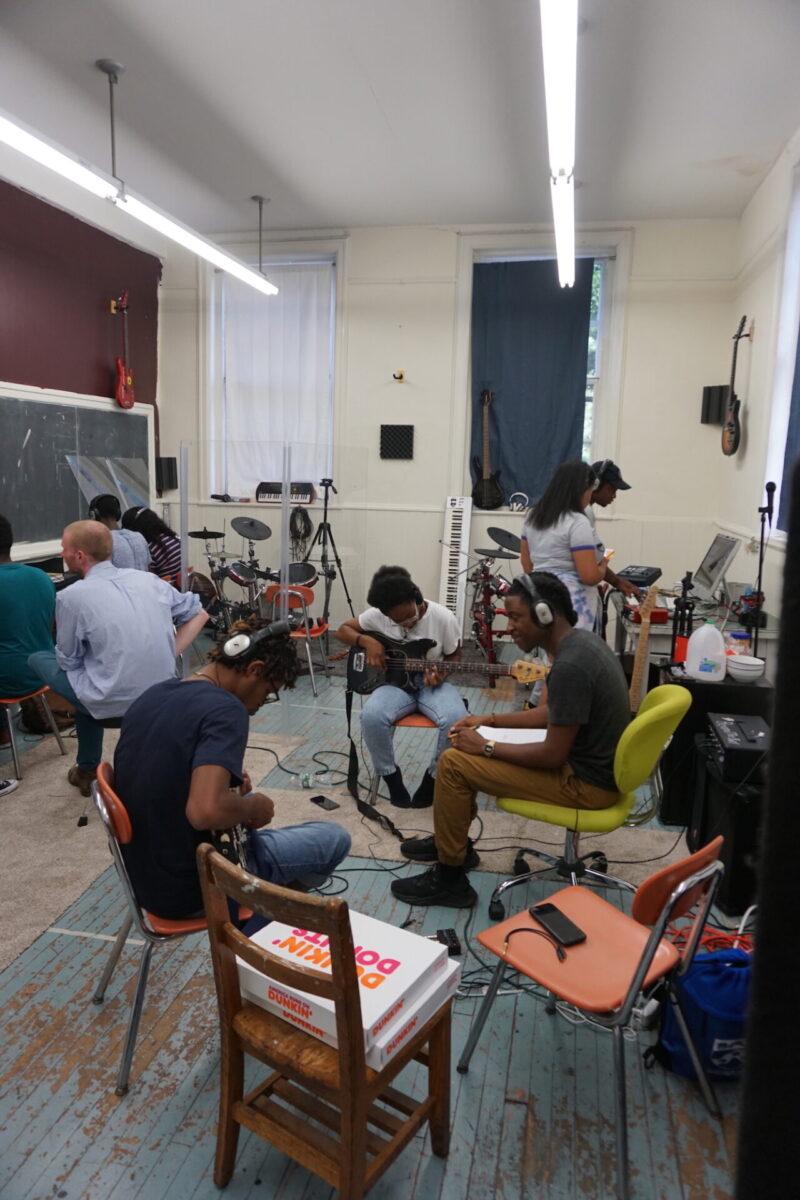
Beyond the Bars | photo by Yoni Kroll for WXPN
“What we try to do is make sure people feel safe here … that they feel a sense of community here, that they feel a sense of family here, that they feel good about themselves here, and they they feel good about their self-efficacy,” he explained, referring to the participants in all of the different programs they offer both in and out of jail.
Kerr is never without effusive compliments for all the students and teachers in the organization. Talking about the pianist and singer who were practicing earlier in the space, he said: “They wrote that song today, out of nowhere. They were just messing around. You know that shit’s going to be fire. So when they perform it, we want our kids to feel like, ‘Everyone is applauding you. You’re amazing. You put work in and you did all that stuff because you’re the bomb.’ We want our kids to internalize that because they are.”
Charmelus brought up the concert the students played with The Districts and Hardwork Movement at World Cafe Live back in May of last year. “They were on stage with all these people … and from that point on they really came into the space, they owned it,” he told The Key. The students have a “thirst and hunger for learning” that he’s excited to help stoke. “When you talk about music programs and school, they’re great because they provide an outlet. But having an actual one-on-one connection with someone who looks like you? It’s unbelievable. There’s no price you can put on it.”
The other volunteers include Elijah Westbrook, Christopher Thornton, Matthew Jernigan, Megan Nicole, and Sharif Lacey, among many others. Like Jordan and Charmelus, many of them play in bands – including Likebirds, Good Girl, Reef the Lost Cauze, Fast Car, Slow Car, The Districts – that regularly tour nationally and even internationally. That for Kerr is “one of the most powerful things about Beyond the Bars.”
While the phrase “giving back” is a popular one when it comes to community-based volunteer work, the teachers at Beyond the Bars have a different take. “I want to be able to provide something that I wish I had,” Charmelus told The Key. Kerr is unsurprisingly more blunt in his assessment: “I feel like ‘taking back’ is a better phrase. What I always say is that schools fail because communities fail, communities fail because schools fail, and they both fail because society failed them by taking away their resources. It’s neither one’s fault: the resources have been taken away. What we’re trying to do is take those resources back and get them back to where they’re supposed to be. It’s not like we’re giving. We’re working together to try and provide what’s an essential human need.”
Beyond the Bars are not alone in this fight. Asked about similar organizations, the volunteers assembled at the CEC named The Center for Returning Citizens, which helps with job placement and other social services for people recently released from prison, the Village of Arts and Humanities, Youth Art & Self-Empowerment Project, homeless advocacy group People’s Emergency Center, and music nonprofits Rock to the Future, Musicopia, and Songs in the Key of Free, the latter of which also works within the prison system.
Kerr, who is white, spoke about how important it is for him and the organization to stay away from the “savior mentality” that is commonplace in the nonprofit world. “The nonprofits that get funding are always on that white messiah bullshit,” he said. “The ones who are doing the most as far as black-led nonprofits are the ones that struggle to get funding. That’s one of the things that’s most frustrating.”
So what can music education actually do to better the lives of those affected by incarceration? The answer is not that simple. As Jordan pointed out, “You can be making music and still end up incarcerated.” But for Beyond the Bars and their army of volunteers it’s imperative to be there for the students. “One of the most important things that a program like this could do is just provide a space to listen,” Charmelus told The Key. He compared that to the kind of nonprofit that just wants to “fix the problem” and move on to the next issue.
Music is an escape, especially when it comes to creating it, and while Beyond the Bars might not be ‘fixing’ mass incarceration they are very much creating an alternative environment for their students. “When we’re in jail we try to make everyone feel like they’re not,” Kerr said. “One of the highest compliments I think we ever got from a student was, ‘When I’m here I don’t feel like I’m in jail.’”
The Beyond the Bars Houseband will be performing at Eastern State Penitentiary on August 29th and have other concerts planned for the rest of the summer. Find out more at beyondthebarsmusic.org
- Beyond the Bars | photo by Yoni Kroll for WXPN
- Beyond the Bars | photo by Yoni Kroll for WXPN
- Beyond the Bars | photo by Yoni Kroll for WXPN
- Beyond the Bars | photo by Yoni Kroll for WXPN
- Beyond the Bars | photo by Yoni Kroll for WXPN
- Beyond the Bars | photo by Yoni Kroll for WXPN
- Beyond the Bars | photo by Yoni Kroll for WXPN
